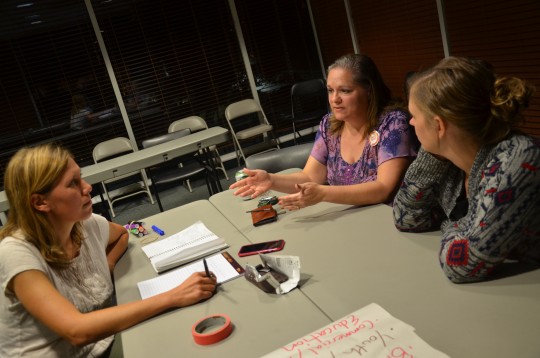
(Photo: M.Andersen/BikePortland)
A group of people who’ve lost family members on Portland-area streets has seen the success of their peers in New York City and is preparing to launch a similar organization here.
“I really am interested in behavior change, cultural change.”
— Kristi Finney
If you know anyone who has lost loved ones to traffic — whether the victim was walking, biking or driving — Oregon and SW Washington Families for Safe Streets is building its network in advance of a planned Nov. 15 launch.
Families for Safe Streets has been a key force behind New York’s rapid adoption of a Vision Zero policy that prioritizes traffic safety over traffic speed. This spring, NYC transportation advocate Paul Steely White told us he’d “never seen a campaign have so much influence over elected officials in such a sort time.”
Oregon and Southwest Washington Families for Safe Streets has been convened by safety advocate Kristi Finney, who lost her oldest son Dustin in 2011 when a young man driving drunk on Division hit him with his car and left the scene.
“I really am interested in behavior change, cultural change,” Finney said Monday. “People just get in their cars and think, you know, ‘accidents happen.’ And I can attest. I didn’t think much about accidents until it happened to us. And then that’s all I could think about.”
Advertisement
Finney, who lives in Vancouver, has spent years testifying for safety policies in Salem, Portland and elsewhere.
“My experience speaking in front of the legislature is that they really do respond much more empathetically to a family member,” she said. She hopes the new group will help get more people with her perspective on traffic violence talking to more politicians more often.
“I didn’t think much about accidents until it happened to us. And then that’s all I could think about.”
—Kristi Finney
Finney has been thinking for years about how to create such a network. In April 2014 she heard about the New York City group from Greg Raisman, a Portland Bureau of Transportation staffer who himself lost a close friend in a street collision. She reached out to their organizers to try learning more. Later, after hearing from Steph Noll of the Bicycle Transportation Alliance, Noel Mickelberry of Oregon Walks and Leah Treat of the PBOT, Finney started organizing locally.
Finney, Noll, Mickelberry and Melissa Hendricks Albright met Monday at Legacy Emanuel Hospital for one of a series of meetings that have so far brought several victims’ families together. They’ve created a closed Facebook group for victims of life-changing traffic collisions and their families as well as an open Facebook page for anyone who wants to follow the group’s activities.
Albright, who lost a loved one on Portland’s Marine Drive, said she agrees with Finney that a core goal is to help people understand that traffic collisions are public problems, not just personal ones.
“It’s a bigger deal than just getting behind the wheel,” she said. “It effects not just you.”
Finney said that’s something every road user should be able to agree on.
“I am really interested in promoting the fact that it really isn’t people on bikes or people walking,” she said. “It’s anybody. It can happen to anybody.”

